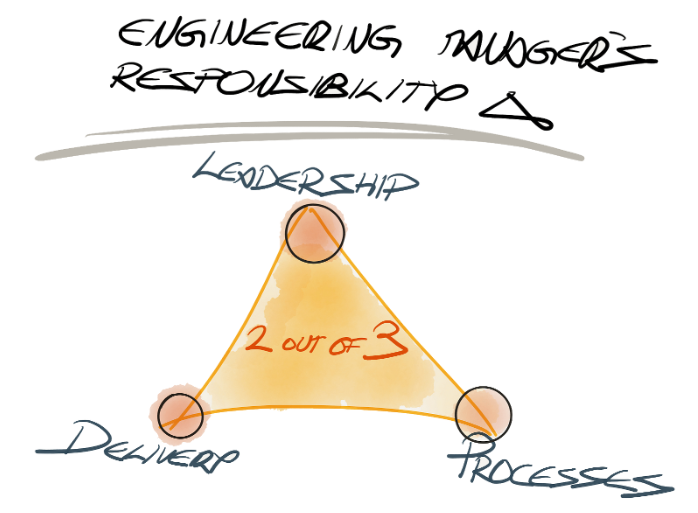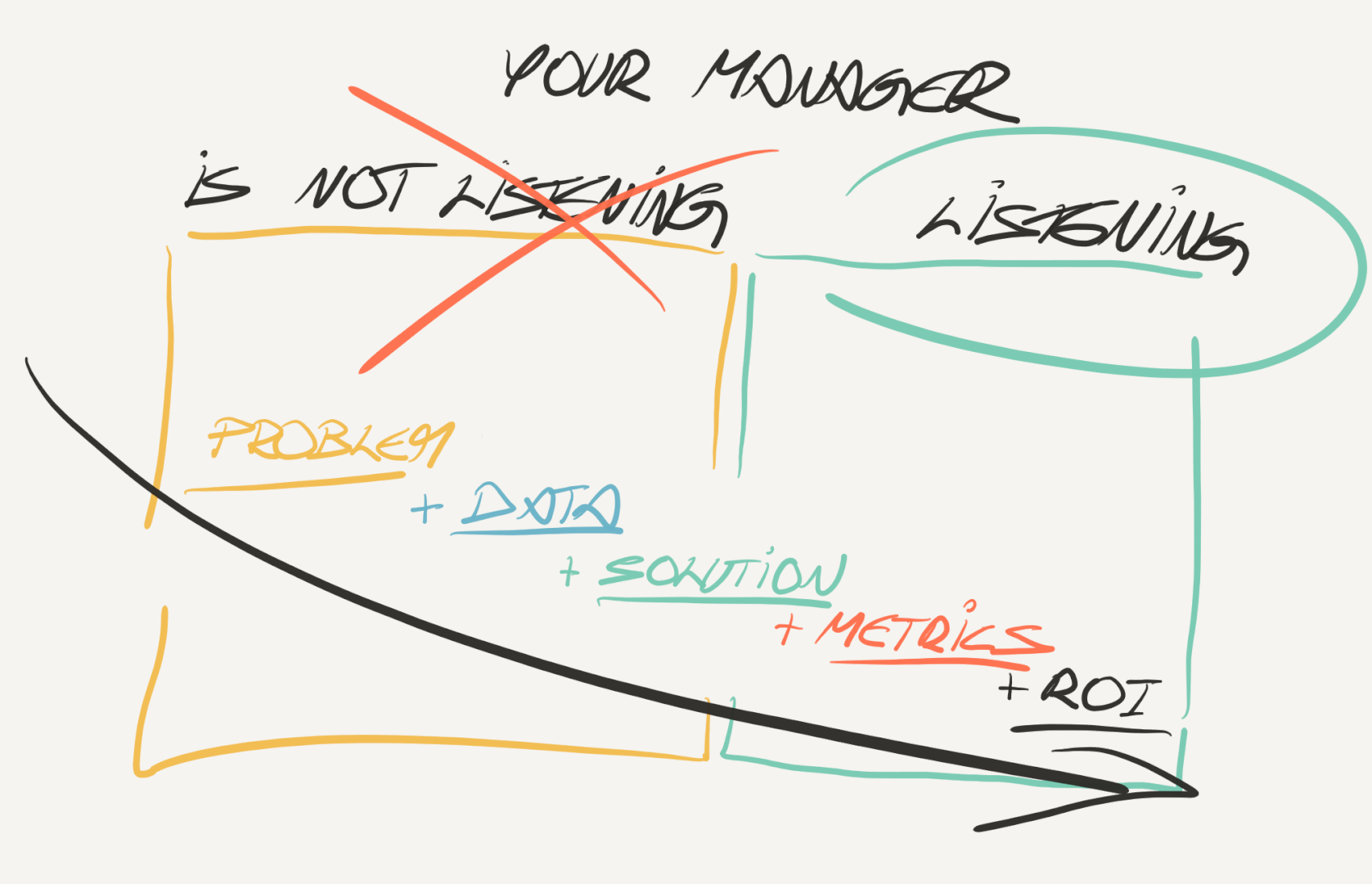As a founder of a small startup, managing everything falls on your shoulders. As the company grows, you find yourself busy resolving architectural issues, hiring, and managing other small priorities, leaving no time for strategy. The need for an engineering manager becomes evident.
How do you identify the right fit? What expectations should you set, and what questions should you ask? If you find a promising candidate, how do you ensure they choose you over your competitors and set them up for success?
This guide will walk you through the steps to identify, interview, and hire the right engineering manager for your startup.
Don’t start from the middle
A common mistake I see many CTOs make is starting the hiring process from an intermediate stage.
They open the pipeline with a generic job description and wait for a miracle to happen.
It usually doesn’t, especially when your description lacks the right appeal/mission.
Define your Engineering Manager‘s triangle
Define the areas you want your engineering manager to cover and to what extent. Let’s call this your EM responsibility triangle, made up of three main components: leadership, processes, and delivery.

Similarly to the CAP theorem, if you expect your engineering manager to oversee all three, you might inadvertently set them up for failure. Focus on two, leaving room to address the third if needed.

What happens if you omit one of the three from the immediate responsibilities?
- Leadership: Focus shifts to a technical manager or lead
- Processes: Overseen by a scrum master or agile coach
- Delivery: Entrusted to a release manager
This approach helps you decide whether to hire a junior, mid, or senior engineering manager based on your specific needs.
Tap into your network
After finalizing your job description, don’t rush to post it online and start hiring. Rather than starting with agencies or HR recruiters (which many people have become allergic to), there’s a better approach:
- Reach out to your network first.
- Do you know someone who might be a good fit for the job at hand?
- Relevant meetups [LINK] offer an opportunity to connect with people contemplating a job change. Plus, attending meetups is a positive indicator of a quality candidate eager to improve their skills.
The 10 questions to Ask engineering managers
Imagine you’re lucky enough to have potential candidates reaching out to you. Now, how do you recognize a good engineering manager during the interview process?
Dig deeper into their attitude toward each component of your EM responsibility triangle with the right questions.
This set of questions also applies to those promoted internally to an “Acting EM” role, as long as you have the time and resources to nurture their development (learning, mentoring, coaching). You should have a strategy for employee growth, recognizing and maximizing their potential. Dedicating 6–12 months to this growth cuts out the need to recruit externally while benefiting from their existing knowledge of the business. However, in my opinion, relying exclusively on managers from within your organization might not offer enough diversity.
1. “How much time do you desire to dedicate to coding?”
The classic struggle for first-time engineering managers often comes down to the balance between coding and managing. Ask them how much time they expect to spend coding vs. managing in the role. If they want to get their hands dirty with coding 50% of the time with a team of 6+, they’re (most likely) misguided. Communicate that to do leadership right, each direct report will require 10–15% of their time.
Even if someone has the potential to be a great leader, they might choose to step down and return to the developer track. Usually, it’s because they still want to be hands-on with coding. That’s why it’s important to carefully gauge the timing for facilitating a smooth transition.
2. “When faced with an urgent task, how would you support your developer in completing it as quickly as possible?”
A subpar response would be deciding to do the task themselves. A better approach would be to collaborate with the developer or pair them up with someone to speed up its completion. But the most impressive answer is when the candidate doesn’t just accept the urgency at face value. Instead, they dig deeper into the reasoning behind it. Often, the perceived urgency is misguided due to a misinterpretation of the situation, or there might already be an existing solution that can be utilized.
3. “How do you prioritize the well-being of your direct reports? / What do your one-on-ones look like?”
There are specific leadership criteria I look for, rooted in the “People First” principle. I want to hear that they prioritize the well-being of their direct reports through frequent one-on-ones that emphasize career growth and skill improvement.
I gain deeper insight into these one-on-ones, their secret tips, and what works for them, paying attention to the proportion of time spent on status updates. If this dominates the discussion, then something isn’t right.
4. “Can you share your experiences with hiring and firing?”
Optimally, the candidate should have some hiring (and firing) experience. I often see managers shying away from firing poor performers because they’re afraid of sending a negative message. A good manager recognizes when tough decisions are necessary for overall team effectiveness.
5. “How do you usually take care of a new starter in the team?”
Onboarding and hiring take precedence over operational work.
6. “What’s your approach to existing workflows within a team?”
It’s paramount that the candidate has been involved in the entire process of releasing a new product from start to finish. A successful product increment goes beyond just following scrum methodologies. I expect them to have experience starting from idea generation and opportunity assessment, all the way to detailed refinement. It’s important to see if they explore the ‘Why’ behind initiatives and try to understand the motivations and benefits for us or the customer before diving into the technical aspects.
I also look for evidence that the candidate’s thought process doesn’t just stop once new features are deployed. Are they proactive in gaining customer feedback and putting in the effort to refine and enhance the new release, making it truly exceptional?
7. “Can you provide examples of when you’ve enhanced existing processes?”
Choose someone with a continuous improvement mindset. If they accept the status quo, they’re dead.
The right candidate experiments with workflow enhancements, from code reviews and testing to meetings, daily standups, and prioritizations. Without this continuous improvement mindset, processes can stagnate and ultimately lead to a deterioration in the team’s efficiency.
8. “How do you manage the daily priorities of your team?”
Given various tasks such as roadmap commitments, bug fixes, addressing technical debt, hiring, onboarding new staff, and responding to improvement requests from their manager, I expect them to demonstrate their ability to ask relevant questions to establish the most effective order of priorities.
Although there’s no one-size-fits-all approach to establishing these priorities without specific context, I evaluate their experience by examining how they inquire about critical aspects: Which tasks are part of the current roadmap, and are we on schedule with it? Which activities facilitate progress for others? Does a bug impact more than 5% of our customers before we classify it as a critical issue?
9. “How do you make sure your team delivers the majority of the roadmap as expected (80%+)?”
What’s your track record in meeting deliverables on a quarterly roadmap?
Find out how successful they are with meeting their goals. Typically, teams operate with a quarterly roadmap outlining specific deliverables. What is their delivery track record? Do they consistently deliver 50%, 80%, or fall within the reasonable threshold of 60–80%? If they haven’t delivered on their roadmap multiple quarters in a row, it’s a red flag.
A good candidate will also have a genuine interest in and connection to the product and be curious about what it does, how it’s monetized, and the overall business model. Asking the right questions about the company’s ongoing work, roadmap goals, and end-of-year improvements signals that the person is interested in what you do beyond the technical aspects.
10. “What is the culture you are really looking for? / What is it you don’t want to experience no more?”
While the triangle is a valuable tool, it isn’t a silver bullet. If there’s no chemistry, cultural alignment, or compatibility with the company’s principles and direct manager, it’s likely not a good fit. Chemistry can make or break the candidate.
In addition, check the candidate’s fit for your product. Are they excited about what the product offers and how it helps the world?
Seal the deal
Sell your story and potential
Once you’ve identified a candidate with promising responses, how do you make sure they sign the contract with you? Identify your differentiators (what sets you apart from your competitors) and market them. Everyone wants to be part of a successful company — if you don’t do the right marketing, it raises questions about its worth. Sell your story and success potential.
Offer onboarding support
First-time managers are hungry for support during their initial months. Instead of adopting a sink-or-swim approach, offer a weekly informal chat, a buddy, or an internal or external mentor to express your commitment to setting them up for success. [LINK]
Extend autonomy and trust
Let them know that once they’ve settled into the new role, it becomes their playground. Show them you can provide autonomy and trust rather than micromanaging their every move.
Conclusion
Hiring your first-ever engineering manager is a pivotal phase for your startup’s growth. It’s not just about finding someone with the right technical expertise; it’s about identifying a true leader who aligns with your company’s vision and can effectively navigate the complexities within the triangle of success. Using this guide, you can find the ideal fit for your startup and set the stage for long-term success and growth.
About Marian Kamenistak
Marian provides coaching and mentoring to engineering managers and leaders across various levels, helping organisations to succeed in building products.
On top, Marian leads the Engineering Leaders CZ community, organising 9 meetups a year for Engineering Leaders, Managers, Tribe leads, VPEs and CTOs in Central Europe.
Read more about Marian’s mission!
Subscribe and stay tuned for the next post! 💪
NB: See
’s article related to this subject, great content: https://www.rubick.com/engineering-manager-vs-tech-lead/



